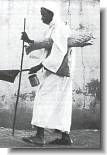|
Who are the homeless?
In the last few years
the number of those living on the street has constantly increased because of the Welfare State crisis, which has concerned many European countries, or because of the worsening economic situation of others countries.
It is a complex uneven world made up of people of very different ages, pathways and situations.
More and more often the reasons which lead to a life on the streets are not rooted in exceptional events or in stories of particular social outcasting. On the contrary these reasons represent events that many people can live: an
eviction notice; family tension without positive solution; the
loss of job; an illness. If there is no helping hand, these life events can transform people having up to that moment a "normal" life into people having nothing. Therefore we encounter
old people with eviction notice; adults loosing any bearings after a separation from their husband or wife and always more often
unemployed young people.
Among the homeless the presence of
foreign people represents another internal problem. They are generally young and sleep on the street only during the first period of immigration because of the lack of structures within the immigration country. They usually live through this experience however humiliating, even if they know that it is obligatory to create a better future for themselves.
 In some countries, especially in the south of the World but also in East European countries, the problem of
street children (meni´┐Żos de rua) is more and more considerable. These are children driven to the street because of extreme poverty or family break-up. In some countries, especially in the south of the World but also in East European countries, the problem of
street children (meni´┐Żos de rua) is more and more considerable. These are children driven to the street because of extreme poverty or family break-up.
 Sometimes, in Africa and in Latin America among the many
beggars, besides leprous or sick people, we encounter whole families who have lost their houses. Sometimes, in Africa and in Latin America among the many
beggars, besides leprous or sick people, we encounter whole families who have lost their houses.
Contrary to popular belief,
living on the street is almost never by choice. In fact life on the street is tough and dangerous; it is a daily struggle of survival. Each year in rich Northern cities of the world and in the poor countries
many people die from hardship or from cold weather.
Even less is being homeless a choice of being "free":
the homeless person lives in a constant plight of great vulnerability, because he or she is forced to depend on other
people, even for elementary needs, susceptible to violence, to the humiliation of being moved on because they are thought of as "undesirable".
|
![]()
